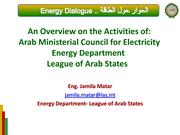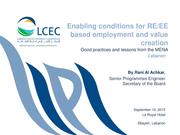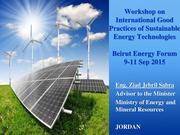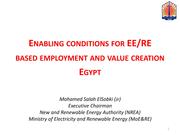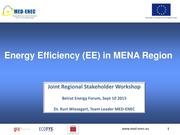Difference between revisions of "SE4JOBS: Joint Regional Stakeholder Workshop at the Beirut Energy Forum 2015"
***** (***** | *****) |
***** (***** | *****) |
||
| Line 67: | Line 67: | ||
| − | = Outlook and Implementation = | + | = Outlook and Implementation =<br/> |
The first national application of the toolbox is previsioned for Egypt. Further application and Trainings are planned for Tunis and Morocco in 2016: | The first national application of the toolbox is previsioned for Egypt. Further application and Trainings are planned for Tunis and Morocco in 2016: | ||
| − | *'''SE4JOBS Expert Workshop Cairo''' (October, 2015)<br/> | + | *'''SE4JOBS Expert Workshop Cairo''' (October, 2015)<br/><br/> |
SE4JOBS and the toolbox will be presented internationally: | SE4JOBS and the toolbox will be presented internationally: | ||
*'''COP21 Paris''' (November, 30th - December, 11th, 2015) | *'''COP21 Paris''' (November, 30th - December, 11th, 2015) | ||
| − | *'''World Future Energy Summit Abu Dhabi '''(January, 2016)<br/> | + | *'''World Future Energy Summit Abu Dhabi '''(January, 2016)<br/><br/> |
Revision as of 11:52, 11 September 2015
INTERNATIONAL GOOD PRACTICES FOR OPTIMIZING SOCIO-ECONOMIC BENEFITS OF SUSTAINABLE ENERGY TECHNOLOGIES: NEW APPROACHES FOR THE MENA REGION
Joint Regional Stakeholder Workshop
10 September 2015, Beirut Energy Forum
Le Royal Hotel, Dbayeh-Beirut, Lebanon
Context
The SE4JOBS Project was launched in 2014 as a collaborative effort of six GIZ projects: the regional project RE-ACTIVATE and five sector projects dealing with different aspects of sustainable energy and socio-economic development. It also involves distinguished external experts and key partners of GIZ, especially from adelphi and the FFU. RE-ACTIVATE serves as a coordinator and "secretariat" of SE4JOBS.
The SE4JOBS Project aims to federate and integrate available worldwide experience on how to strengthen the link between local socio-economic development and sustainable energy technologies. The focus is on local employment and income creation. The goal is to provide a set of specific, application-oriented instruments and recommendations helping policy makers and practitioners to develop better policy approaches and institutional settings for an optimal valorization of the socio-economic effects of sustainable energy technologies.
In the scope of SE4JOBS the following key deliverables are currently under development:
- A set of good-practice country studies of RE/EE success cases based on local employment & value chain creation in developing & emerging country contexts.
- The development of an application-oriented toolbox based on the results of these studies as well as on available worldwide experience in this regard.
- The identification of key entry points, onboarding opportunities and knowhow transfer potentials of key partner countries in MENA.
The workshop is one in a series that allows an interactive exchange with local and international stakeholders and experts, and foster the inclusion and participation of actual or potential users of the toolbox.
Agenda and Presentations
| 13:00 – 13:30 |
Registration |
| 13:30 – 14:15 |
Opening of the workshop, welcome of participants Pierre El-Khoury, Lebanese Center for Energy Conservation (LCEC)
|
| 14:15 – 16:00 |
Maximizing the socio-economic value of renewable energy and energy efficiency through new policies and tools |
| 16:00 – 16:15 |
Coffee Break |
| 16:15 – 16:30 |
Keynote Speech on Renewable Energy Growth in the Arab Region |
| 16:30 – 18:00 |
Enabling conditions for RE/EE based employment and value creation: Good practices and lessons from the MENA Lebanon Jordan Tunisia Egypt Energy Efficiency in the MENA Region |
| 18:00 – 18:30 |
Main takeaways of the workshop |
Participants and Report
- The report and the list of the participants will be uploaded soon.
Main Conclusions
- Political commitment: In order for the stakeholders to move ahead, transparent roadmaps in the shape of targets that can be monitored and evaluated and regulatory frameworks and financing mechanisms are important. The political will needs to be translated into a transparent institutionalized framework.
- Mutual trust: Confidence of the private sector in the potential growth and the confidence of the governance in the socioeconomic impact of the sector has to be deepened.
- Standards and quality control: Potential to ensure quality through training and standards on a national and regional level, taking into consideration specific circumstances in these areas.exchange on standards and monitoring with compliance on standards on national and regional level. Cross-country infrastructure could further enable the development of a regional market.
- Regional exchange of good practices: More and more nations enter EE&RE markets and few consolidated knowledge exists to identify and implement the best practices.
- Public policy: Plays the key roll in developing functional domestic markets. In order to arrive at good policy developpement and implementation following point would be beneficial:
- Availability of data of good quality. We need to work more on producing and sharing data in order to enable realistic policies.
- Stakeholders Coordination: The lack of cross sectorial exchange on a government level for corresponding education, training and research needs to be addressed.
- Addressing trade-offs: Factors like jobs impacts, maintaining and building quality infrastructure have to be analyzed for each technology in its possible application.
- Development of SME: There is a large potential in building capacities and prepare potential entrepreneurs to enter the market.
= Outlook and Implementation =
The first national application of the toolbox is previsioned for Egypt. Further application and Trainings are planned for Tunis and Morocco in 2016:
- SE4JOBS Expert Workshop Cairo (October, 2015)
SE4JOBS and the toolbox will be presented internationally:
- COP21 Paris (November, 30th - December, 11th, 2015)
- World Future Energy Summit Abu Dhabi (January, 2016)

